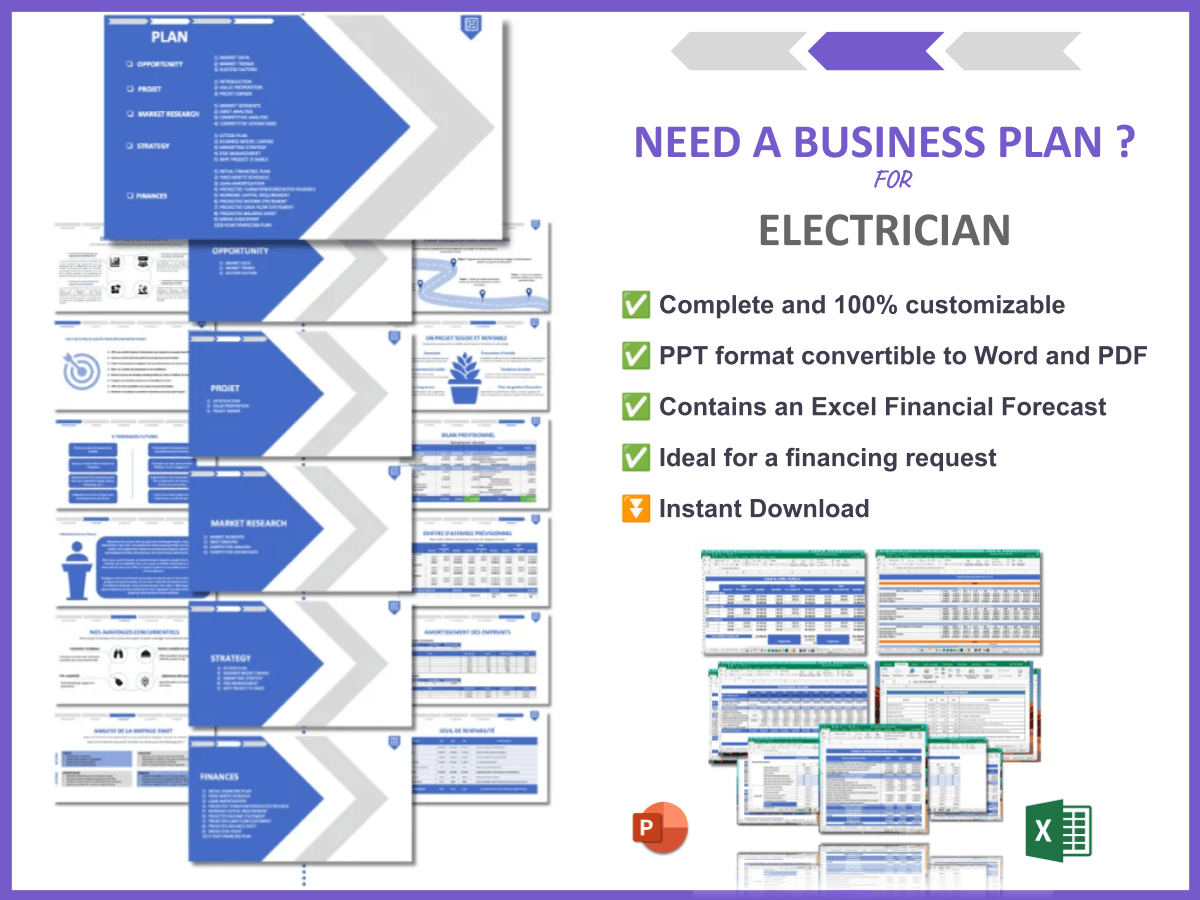Are you thinking about starting a business as an electrician? You’re not alone! The electrical services market is booming, with a growing demand for skilled electricians. Starting your own electrician business can be a rewarding venture, both financially and personally. In this article, we’ll explore the essential steps to get you on the right path.
Before you dive into the nitty-gritty, it’s crucial to refine your business idea. Think about what specific services you want to offer. Residential, commercial, or industrial electrical work? Specializing can set you apart. For example:
- Smart home installations
- Energy-efficient solutions
- Electrical repair and maintenance
Consider what makes your approach unique. This will help you define your target market. Understanding your niche will not only guide your marketing strategies but also enhance your service quality, making you a go-to expert in that area.
1. Refine Your Business Idea for Your Electrician Business
Identifying a niche within the electrical field can significantly impact your success. It’s not just about offering general services; it’s about standing out in a competitive market. Here’s a simple breakdown:
| Niche | Potential Clients | Unique Selling Proposition |
|---|---|---|
| Residential | Homeowners | Personalized service and quick response times |
| Commercial | Businesses | Efficiency and reliability |
| Industrial | Factories | Expertise in complex systems |
By defining your niche, you can tailor your services and marketing efforts to attract the right clients. Think about your skills, interests, and the needs of your community. This is where you can truly shine!
2. Research the Market and Assess Your Competitors
Understanding the competitive landscape is key to your success. Start by identifying who your competitors are and what they offer. You can create a simple table to analyze them:
| Competitor | Services Offered | Pricing |
|---|---|---|
| Competitor A | Residential & Commercial | $$ |
| Competitor B | Energy Audits | $$$ |
| Competitor C | Smart Home Installations | $$$ |
This analysis will help you find gaps in the market that you can fill. For instance, if you notice that no one is offering energy-efficient solutions in your area, that could be your ticket to standing out. Additionally, consider conducting surveys or talking to potential clients to better understand their needs and preferences.
3. Choose a Memorable Name for Your Electrician Business
Your business name is your first impression. It should be catchy, memorable, and relevant. Here are some tips to help you brainstorm:
- Keep it short and simple: A name that is easy to remember will stick in potential clients’ minds.
- Incorporate keywords: Words like “electric,” “power,” or “current” can help your business show up in online searches.
- Check domain availability: Ensure that a matching website domain is available for your business name.
Think of names that reflect your services and values! For example, if you specialize in smart home installations, you might consider names like “Smart Electric Solutions” or “Future Power Electric.” Testing your name with friends or potential clients can also provide valuable feedback.
4. Create a Detailed Business Plan for Your Electrician Business
A business plan is your roadmap to success. It outlines your goals, strategies, and financial projections. A well-structured business plan can be the key to securing funding and guiding your decisions. I recommend checking out this business plan template for Electrician. It’s super detailed and can save you a ton of time!
Your business plan should include:
- Executive Summary: A snapshot of your business and plans.
- Market Analysis: Insights into your industry and competitors.
- Marketing and Sales Strategies: How you plan to attract and retain clients.
- Financial Projections: Expected income, expenses, and profitability.
Consider this table as a guideline for structuring your business plan:
| Section | Description |
|---|---|
| Executive Summary | Brief overview of your business concept, vision, and mission. |
| Market Analysis | Analysis of your target market and competitive landscape. |
| Marketing Strategy | Plans for advertising, promotions, and customer engagement. |
| Financial Plan | Detailed budget, funding sources, and profit forecasts. |
Having a solid business plan not only helps you focus on your goals but also prepares you for discussions with potential investors or lenders. It’s a vital step in your journey to successfully establishing your electrician business.
5. Decide on the Legal Structure for Your Electrician Business
Choosing the right legal structure for your electrician business is essential for protecting your personal assets and ensuring compliance with laws. Here are some common structures to consider:
| Structure | Pros | Cons |
|---|---|---|
| Sole Proprietorship | Easy to set up and manage | Unlimited personal liability |
| Limited Liability Company (LLC) | Limited liability protection for personal assets | More paperwork and fees |
| Corporation | Limited liability and easier to raise capital | Complex structure and regulations |
Consider consulting with a legal expert to choose the best fit for your situation. The right structure can help you minimize taxes and protect your business interests. Don’t overlook this crucial step!
6. Secure Funding and Financial Resources for Your Electrician Business
Starting a business often requires upfront investment. To effectively launch your electrician business, you’ll need to secure adequate funding. Here are some funding options to consider:
- Personal Savings: Using your own money can help avoid debt.
- Small Business Loans: Many banks and credit unions offer loans specifically for startups.
- Crowdfunding: Platforms like Kickstarter or GoFundMe allow you to raise money from the public.
- Grants: Research local or federal grants for small businesses in the trades.
Make sure you have a financial plan that covers initial costs, such as tools, equipment, and marketing expenses. Here’s a simple list of what you might need to budget for:
- Tools and Equipment: Essential for your services.
- Vehicle: Reliable transportation for job sites.
- Marketing Costs: Website, business cards, and advertising.
- Insurance: Protects your business from liabilities.
By exploring various funding sources and budgeting carefully, you can ensure that your electrician business starts on solid financial ground.
7. Register Your Business to Make Your Electrician Business Official
Once you’ve nailed down your name and legal structure, it’s time to register your business. This step is crucial to ensure your electrician business is recognized legally and can operate smoothly. Here’s a simple checklist to guide you:
- File Your Business Name: Register your business name with local authorities to make it official.
- Obtain Necessary Licenses and Permits: Research what licenses you need to operate legally in your area. This may include specific electrical contractor licenses.
- Set Up a Business Bank Account: Keeping your personal and business finances separate is essential for good financial management.
Make sure everything is compliant with local regulations! Failing to register your business correctly can lead to fines or legal issues down the road. It’s best to check with your local chamber of commerce or business office for specific requirements in your area.
8. Obtain Necessary Tax Identification Numbers, Licenses, and Permits for Your Electrician Business
Every electrician needs to comply with local laws. This means obtaining the right licenses and permits to operate legally. Here are the steps you should take:
- Apply for an EIN (Employer Identification Number): This is essential for tax purposes, especially if you plan to hire employees.
- Research State-Specific Electrician Licenses: Different states have varying requirements. Make sure you meet all the criteria.
- Check for Local Permits Required for Electrical Work: Some cities may require additional permits for specific jobs.
Here’s a quick table summarizing common licenses and permits you might need:
| License/Permit | Description |
|---|---|
| State Electrical License | Required to perform electrical work legally. |
| Business License | General license to operate a business in your locality. |
| Contractor’s License | Needed for businesses performing contracting work. |
Make sure to keep all your documents organized and easily accessible. Staying compliant not only protects you legally but also builds trust with your clients, showing that you are a professional in your field.
9. Apply for Business Insurance Coverage for Your Electrician Business
Insurance is a must-have for any contractor. It protects you from liabilities and unforeseen events that could jeopardize your electrician business. Here are some types of insurance to consider:
- General Liability Insurance: Covers accidents or injuries that occur on the job site.
- Professional Liability Insurance: Protects against claims of negligence or mistakes in your work.
- Workers’ Compensation Insurance: Required if you have employees, this covers medical expenses and lost wages for work-related injuries.
Here’s a quick overview of why each type of insurance is important:
| Type of Insurance | Coverage | Importance |
|---|---|---|
| General Liability | Injuries, property damage | Protects your business from lawsuits |
| Professional Liability | Errors, omissions | Covers legal costs if a client sues |
| Workers’ Compensation | Employee injuries | Ensures employees are covered for injuries |
Consult with an insurance agent to find the best coverage for your needs. Investing in insurance is a crucial step in safeguarding your business and ensuring peace of mind while you work.
10. Set Up Your Financial Management Systems for Your Electrician Business
Keeping track of finances is crucial for any business, especially for an electrician business. You can use accounting software or hire a professional. Here are some tips to manage your finances effectively:
- Track Income and Expenses Regularly: Use software like QuickBooks or FreshBooks to monitor your cash flow.
- Prepare for Tax Season in Advance: Set aside funds for taxes to avoid any surprises.
- Monitor Cash Flow to Ensure Profitability: Regularly review your financial statements to understand your financial health.
Here’s a simple list of key financial documents you should maintain:
- Income Statements: Shows your revenues and expenses over a specific period.
- Balance Sheets: Provides a snapshot of your assets, liabilities, and equity.
- Cash Flow Statements: Tracks the flow of cash in and out of your business.
By setting up a solid financial management system, you can ensure that your electrician business remains profitable and sustainable. Don’t underestimate the importance of staying organized and proactive in your financial planning!
11. Establish Your Brand Identity for Your Electrician Business
Your brand is how customers perceive you, and it plays a crucial role in attracting clients to your electrician business. A strong brand identity includes your logo, colors, and messaging. Here are some strategies to build your brand:
- Design a Professional Logo: Your logo should reflect your services and values. Consider hiring a graphic designer or using online tools.
- Create Business Cards: Always have business cards on hand to share your contact information with potential clients.
- Develop a Consistent Online Presence: Ensure your website and social media profiles align with your brand identity.
Here’s a simple table summarizing elements of a strong brand identity:
| Element | Description |
|---|---|
| Logo | A visual representation of your business. |
| Color Scheme | Colors that evoke specific feelings and represent your brand. |
| Brand Voice | The tone and style of your communication. |
Make sure your branding reflects the quality of your services. A well-established brand can differentiate you from competitors and build trust with clients.
12. Develop a Professional Website for Your Electrician Business
A website is your online storefront and a crucial tool for attracting clients. It should be user-friendly, informative, and visually appealing. Key elements to include on your website are:
- Service Descriptions: Clearly outline the services you offer and what makes you unique.
- Contact Information: Make it easy for potential clients to reach you.
- Client Testimonials: Showcase reviews from satisfied customers to build credibility.
Consider using website builders like WordPress, Wix, or Squarespace if you’re not tech-savvy. A professional-looking website can significantly enhance your online presence and attract new clients.
13. Market and Advertise Your Electrician Business
Once everything is set up, it’s time to attract clients! Here are some effective marketing strategies to consider:
- Use Social Media: Platforms like Facebook and Instagram can help showcase your work and engage with your community.
- Network with Local Businesses: Building relationships with other local businesses can lead to referrals.
- Invest in Online Advertising: Consider Google Ads or Facebook Ads to reach a wider audience.
Don’t forget to ask for referrals from satisfied clients! Word-of-mouth advertising is incredibly powerful in the service industry.
By implementing these marketing strategies, you’ll be well on your way to establishing a successful electrician business. Remember, persistence and adaptability are key in growing your clientele and reputation in the industry!
Conclusion
Starting your own electrician business can be a fulfilling and lucrative endeavor. By following the steps outlined in this guide, from refining your business idea to marketing your services effectively, you can set yourself up for success. Remember, the journey may have its challenges, but with determination and a solid plan, you can thrive in this growing industry.
For further insights, I encourage you to check out our articles on creating a SWOT Analysis for Electrician and how to launch an Electrician Marketing Plan. These resources can provide you with valuable strategies and examples to enhance your business approach.
FAQ
- What qualifications do I need to become an electrician?
To become an electrician, you typically need a high school diploma or equivalent, followed by an apprenticeship program. Licensing requirements vary by state, so it’s essential to check local regulations. - How much does it cost to start an electrician business?
The startup costs can vary widely, but you should budget for tools, insurance, licensing fees, and marketing. On average, starting an electrician business can range from $5,000 to $20,000. - How do I find clients for my electrician business?
Building a client base involves networking, online marketing, and providing excellent service. Consider using social media, local advertising, and word-of-mouth referrals to attract customers. - What types of services can I offer as an electrician?
You can offer a variety of services, including residential wiring, commercial installations, energy audits, and smart home technology installations. Specializing can help you stand out in the market. - Do I need a business license to operate as an electrician?
Yes, obtaining a business license is typically required. Additionally, you will need the appropriate electrical licenses to legally perform electrical work in your area. - What insurance do I need for my electrician business?
Key types of insurance include general liability, professional liability, and workers’ compensation. These protect you from legal claims and financial losses. - How can I effectively market my electrician business?
Effective marketing strategies include creating a professional website, utilizing social media, networking with local businesses, and investing in online ads. Customer referrals also play a significant role. - Is it necessary to have a business plan?
Yes, having a business plan helps you define your goals, strategies, and financial projections. It serves as a roadmap for your electrician business and is essential if you seek funding. - What are the benefits of becoming a licensed electrician?
Being licensed enhances your credibility, allows you to work legally, and can lead to better job opportunities and higher pay. Clients often prefer to hire licensed professionals. - How do I stay updated with industry standards and regulations?
Continuing education and training are vital. Attend workshops, join professional organizations, and keep abreast of local codes and changes in electrical technology.







